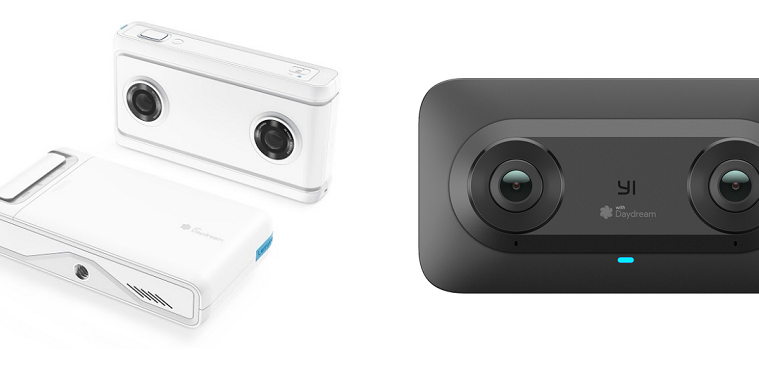During the VidCon event held in June 2017, YouTube CEO Susan Wojcicki announced the VR180 format aimed at capturing immersive ultra HD 4K photos and videos in 3D, allowing viewers to re-experience some of their best moments on VR headsets like Daydream.
To achieve this, Google went into partnership with third-party OEMs to build special, easy to use cameras that are now official thanks to the CES 2018. Led by the Lenovo Mirage and YI Horizon, these VR180 cameras are meant to be as simple as possible in order to accommodate those who have never delved into the VR world.
The two VR180 cameras, which capture only half of what existing 360-degree solutions can manage, are basically point-and-shoot units. Both the Lenovo Mirage VR180 and YI Horizon VR180 cameras have dual 13MP lenses that can provide twice the resolution of 360-degree solutions. According to YI Technology, the Horizon VR180 can capture 3D videos of up to 5.7K resolution at 30fps. The camera also features a 2.2-inch touchscreen on the rear with 640 x 360 pixels resolution.
Where the Lenovo Mirage comes in white, the YI Horizon has a black finish. Interestingly, though, is that the YI Horizon’s display can be flipped around to capture a VR180 selfie, which is pretty cool. Like any other VR180 camera, these two will let users upload content directly to Google Photos or YouTube, which can then be viewed with or without a VR headset.
According to Lenovo, the Mirage VR180 camera is powered by a Snapdragon 626 processor and supports features like Wi-Fi, Bluetooth and expandable storage. With the 2200mAh battery unit, you’ll be getting at least 2 hours of use and for the charging, you get a USB Type-C port. Both cameras can also start YouTube HD livestreams in 3D as well as record video. Even though the content can be viewed on a standard screen, it’s supposed to be used with a VR headset. You also get support for Google’s VR180 companion app for uploading and viewing content.
The two VR180 cameras will start selling this spring, but the exact date and price details are still unknown.

In addition to the two VR180 cameras, Google has finally unveiled its standalone Daydream VR headset in conjunction with Lenovo. Dubbed Lenovo Mirage Solo, this headset is meant to give you the best of VR experiences without the usual hassles involved, be it finding a compatible smartphone, connecting to a PC or any other external peripherals.
The Mirage Solo comes with Google WorldSense technology that substitutes the need for external sensors by offering integrated positional tracking. It also packs a 5.5-inch QHD screen with a 6DoF view, a more powerful Snapdragon 835 Mobile VR Platform, 4GB RAM, 64GB of built-in storage and a huge 4000mAh battery unit.
The Lenovo Mirage Solo VR headset will start selling in Q2 priced at under $400, but the exact date is still unknown.






